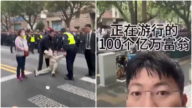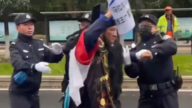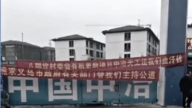【新唐人2013年10月09日讯】今年以来,大陆各地民众大规模向政府示威抗议的事件不断,抗议原因9成以上与当局强拆房屋、强占土地、和政府官员贪腐不作为有关。抗议方式包括静坐、游行甚至打砸围攻。民众表示,在维权通道被堵死、官官相护、法律形同虚设的情况下,走投无路的百姓唯有被迫起来反抗。而评论认为,随着中共剥削的加重与民心的背离,“官逼民反”的现象还会进一步加剧,最终席卷全中国。
今年下半年,大陆广东、广西、河南、河北、四川、安徽、福建等地,相继爆发了大规模民众围堵政府的事件。
据《自由亚洲电台》报导,广东省惠东县稔山镇稔石村的近百村民,10月3号开始,连续3天举行游行示威。村民打着“打倒腐败,打倒贪官,偷卖土地”的横幅,沿路喊着口号抵达镇政府。村民们抗议村委假冒村民签字,私卖山地牟利,并且抗议县和镇政府包庇贪腐村官。
广东省惠东县稔山镇稔石村临村村民:“几年前我们村民的山给它卖了嘛,给它政府偷卖了,现在就找它讨回来,它们不给啊!反映了,他们说是历史存留的问题,他们村民不满意呀,在围堵政府。”
10月5号晚,广东当局以“非法集会”的理由,派出大批特警到现场强力清场,抓走了几位所谓“领头”的村民。
山东潍坊网友质问当局:“有合法的集会吗?”
河南网友说:“唱赞歌的集会合法,但是没有人去,人们想去表达真实意愿的集会,你说不合法!”
广东省惠东县稔山镇稔石村临村村民:“聚会?肯定搞到我们农村的地给我们卖了,肯定得去找理,找不到,我们肯定要聚会了,聚会去找回来,讨回公道啊!公道都没人还给我们,我们怎么去找啊?农村里面讨回公道难申诉的。我们朝廷里面没官,只能给政府逼呀!”
与广东情况相似的是,广西恭城县政府在3号也遭到了民众围堵,恭城县莲花镇湖里村的上百村民在县政府门口静坐示威,并将申诉材料贴满政府门口,抗议村官截留侵吞公益林补贴款十几年,以及中共警察进村殴打和抓捕村民的暴行。
据了解,“十一”前夕,当地村民已经与警察发生了冲突,连续两天近30辆警车闯入村中施暴,造成30多名村民被殴打致伤,一名八旬老人生命垂危。
此外,10月1号,河北省定州市支白土村,也发生了数百村民围堵打砸当地村委会,抗议强征土地事件﹔9月,河南省焦作上千民众包围政府,抗议当局官商勾结骗取百姓血汗钱﹔8月,安徽省宣城市荆州乡政府被上千村的村民围攻,抗议政府抗旱不力,私吞抗旱物资。由于村民向当地官员讨说法没有结果,愤怒的村民将办公大楼门窗砸毁,数辆车被砸毁掀翻,多名政府官员被围殴﹔7月,广州番禹上千村民占领村委会,集体签名罢免现任村书记,抗议村官贪腐、私自出租土地等等,诸如此类的“官逼民反”事件接连在大陆各地上演。
广东省惠东县稔山镇稔石村临村村民:“搞到我们村民没地方、无路可逃到时候就会这样子做啦,最简单一句,谁有饭吃不想吃饭呢?搞到我们没饭吃的话,我们就会这样啦,村民都是这样,没办法。”
群众事件起因于﹕社会底层为争取自身权益而与统治阶层发生对抗,或因统治阶层不当行为触怒民众而引发冲突。专家认为,官民持续长时间的对立,会引发大规模冲突,而冲突升级,就会引发政局动荡甚至战争,最终导致政权的灭亡。
采访编辑/张天宇 后制/李勇
Mass Protests Escalate Across China
A series of mass protests have continued in China this year,
taking the form of sit-ins, marches, even physical violence,
with over 90% being linked to forced house demolitions,
land grabs, and corruption.
Devastated citizens say they have been forced to fight
against officials who are abusing people’s rights and laws.
The rebellion is believed to soon sweep the nation as friction
escalates between the people and the communist regime.
Since July, mass protests have broken out near surrounding
governmental buildings in provinces such as Guangdong,
Guangxi, Henan, Hebei, Sichuan, Anhui, Fujian, and others.
Radio Free Asia reports that nearly 100 Guangdong villagers
started a three-day demonstration on October 3.
Protesters marched to Huidong County Office with banners
saying: “Down with corruption, down with corrupt officials
who steal our land.”
The county and town governments have ignored the charge
that the village committee sold land using fake signatures.
Villager of Huidong County, Guangdong:
“They sold our mountain a few years ago—they stole it;
we want it back, but they refuse to, claiming it’s in the past—
we villagers disagree and so we are surrounding the office."
On Oct. 5, evening, special police from Guangdong arrested
alleged ‘village leaders’ on charge of “gathering unlawfully".
An internet user in Shandong asked,
“Is there such a thing as a ‘lawful gathering’?"
A Henan netizen wrote, “Gathering to praise is ‘lawful’,
but no one will; then gathering to address issues is unlawful?”
Villager of Huidong County, Guangdong:
“Gathering?—they sold our land, we have to get it back
as they won’t return it; we’ll get it back our way.”
“We are fighting for justice, otherwise, no one else will do it;
the government has forced us to do this."
Protests also arose on Oct. 3 with over 100 villagers from
Gongcheng County in Guangxi carrying out sit-ins in front of
the government hall, against village officials who have
allegedly embezzled over 10 years of forest subsidies.
Local police violently beat and arrested the villagers.
Prior to Oct 1, conflicts had already broken out between
the villagers and the police.
In two days, 30 police vehicles entered the village,
and more than 30 villagers were injured in clashes,
including an 80-year-old man who is in critical condition.
Multiple mass protests against corrupt officials
have been taking place across China.
Violent protests against forced land grabs which affected
hundreds of locals arose in Hebei on Oct 1.
In September, thousands of Henan locals protested against
collusion between government and businesses.
In August, Anhui villagers protested against
the Jingzhou township for mismanaging drought aids.
Angry villagers smashed town hall windows and vehicles,
and beat several town hall officials.
In July, Guangzhou villagers with thousands of signatures
occupied the secretary’s office, requesting the removal
of the secretary for corruption and illegal land leasing.
Villager of Huidong County, Guangdong:
“We’ve been forced into a dead end—simply put, if we were
left with a way to live, we would not have resorted to this."
The mass protests are mainly based on people fighting for
their personal rights against the ruling class, or arose because
people were offended by the misconduct of the ruling class.
Prolonged opposition between officials and the public
have lead to large-scale conflicts.
Experts believe that the escalating conflicts will lead to
further political instability and even to a war breaking out,
which will subsequently lead to the demise
of the Chinese communist regime.
Interview Edit / Zhang Tianyu Post-production





























